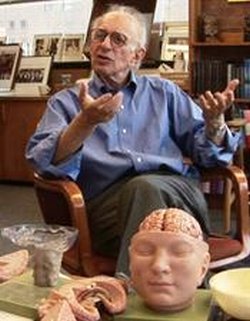University of Rochester to Honor Nobel Prize Winner March 24 …
University of Rochester to Honor Nobel Prize Winner March 24
Event includes Rochester premiere of documentary on renowned neuroscientist


Eric Kandel, M.D., is one of the world's most respected neuroscientists.
Nobel Laureate Eric Kandel, M.D., will receive the University of Rochester’s Eastman Medal Thursday, March 24, at the School of Medicine and Dentistry. Kandel received the Nobel Prize in Physiology or Medicine in 2000 for his outstanding research into the understanding of memory.
The award ceremony will begin at 1 p.m. in Class of ’62 Auditorium in the University of Rochester Medical Center. University President Joel Seligman, Chairman of the Board Emeritus G. Robert Witmer and Medical Center CEO Bradford C. Berk, M.D., Ph.D., will present the Eastman Medal to Kandel.
The Eastman Medal, named for George Eastman, philanthropist and founder of the Eastman Kodak Co., and a benefactor of the University, is awarded to individuals who, through their outstanding achievement and dedicated service, embody the high ideals for which the University stands.
In addition to receiving the award, Kandel will deliver a lecture titled “The Short and Long of Long-term Memory,” followed by a screening of documentary “In Search of Memory.” This film, which begins at 2:15 p.m., recounts Kandel’s life, including his childhood experiences in Nazi-occupied Austria and his emigration to the United States, and chronicles scientific developments in our understanding of the brain’s role in recording and preserving memory. Kandel will introduce the film, which is sponsored, in part, by Hillel.
As one of the world’s most respected neuroscientists, Kandel pioneered much of our modern neurological understanding of memory. He was the first to demonstrate how neurons store information and how the brain’s cellular and circuitry systems process and manage that information over time.
His transformative research has provided new insights into the connections between the psychological processes of learning and the cellular signaling of neurophysiology. His findings hold promise for understanding and treating Alzheimer’s disease and other neurological disorders.
Kandel was born in Vienna, Austria, in 1929 and emigrated from the Nazi-occupied country to the United States with his family in 1939. Educated at Harvard University and New York University School of Medicine, he began his research career at the National Institute of Mental Health, where he studied mammalian brain neurophysiology with Wade Marshall. After completing his residency in clinical psychiatry, Kandel then began work as a staff psychiatrist at Massachusetts Mental Health Center in Boston while continuing research and teaching at Harvard Medical School.
In 1965, Kandel joined the faculty at New York University Medical School and then Columbia University in 1974 and became director of the Center for Neurobiology and Behavior shortly thereafter. He is the Fred Kavli Professor and director of the Kavli Institute for Brain Science at Columbia University.
Throughout his career, Kandel has maintained an active interest in clinical psychiatry and the exchange of ideas between diverse disciplines examining the relationship between mind and brain.
* The above story is reprinted from materials provided by University of Rochester Medical Center



















